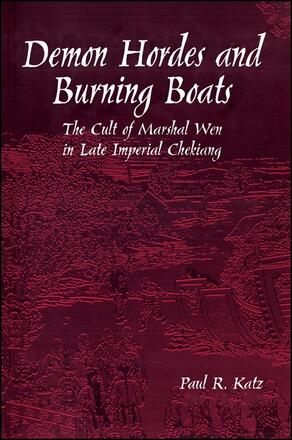
Demon Hordes and Burning Boats
The Cult of Marshal Wen in Late Imperial Chekiang
Alternative formats available from:
Provides a lively description of how the cult of a popular plague-fighting deity named Marshal Wen arose and spread in late imperial China.
Description
One of the few full-length regional studies of popular religion in late imperial China, this book presents the history of the cult of Marshal Wen, a plague-fighting deity whose cult flourished through Chekiang and its neighboring provinces. The author provides a lively account of the rise of Wen's cult during the tumultuous years of the Southern Sung dynasty, as well as its spread during subsequent dynasties. In exploring the roles played by scholar-officials, merchants, and Taoist priests in the growth of Wen's cult, the author pays special attention to the various representations of this deity held by different social groups, and shows that these were constantly interacting in a process he calls "reverberation. " His analysis of plague expulsion festivals featuring Marshal Wen reveals that they functioned as rites of affliction designed to both achieve communal purification and resolve social crises.
This book draws on a wide variety of sources, including Taoist scriptures and liturgical texts, stele inscriptions, literati writings (including poetry), manuscripts from local archives, as well as popular novels and folktales. The author also supplements his historical research with data gathered during fieldwork in Chekiang and Taiwan
Paul R. Katz is a Assistant Professor in the Institute of History at National Central University in Taiwan.
Reviews
"I found it absolutely fascinating. The material is extremely compelling, partly because the sources are unusual and partly because the cult of King Wen turns out to be far more important than it has been given credit for.
"Specialists and casual readers alike have long known that a important feature of traditional religion involves control of disease and epidemics. Specialist have also known that disease-related cults existed along the Southeast Chinese coastal areas, often linked to the syllable 'wen. ' This is the first book to address this directly. Growing interest in the role of disease in history and in the anthropology of medicine adds to the timeliness of the topic. The beginning of the book throws the issue of disease into high relief and shows that religious reactions to epidemics will necessarily be an important issue, one which we have tended to overlook because fear of epidemics is peripheral in contemporary Chinese religion. Katz then draws on evidence confirming the importance of fear of epidemics in Chinese religion, highlights some of the confusing ambiguities that have bedeviled the study of this, and then clearly lays out the historical materials that document the growth of plague god cults in late imperial China. " -- David K. Jordan, University of California, San Diego